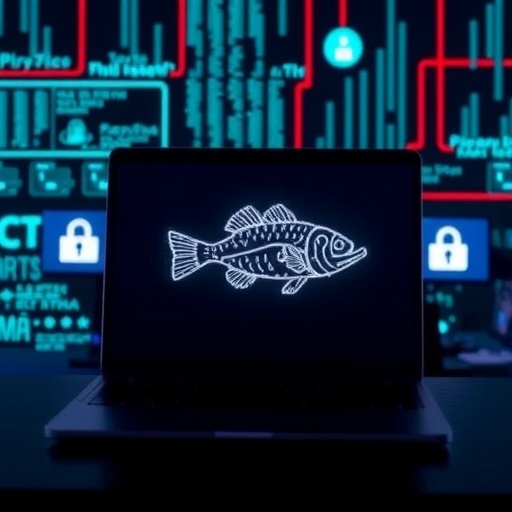Title: Rethinking the Approach to Phishing Training: New Insights from USF Research
In the fast-paced realm of cybersecurity, organizations have traditionally relied on simulated phishing attacks to gauge employee vulnerability. However, recent research led by the University of South Florida (USF) challenges this conventional methodology, suggesting that the immediate feedback typically associated with phishing simulations may do more harm than good. This groundbreaking study dives into the psychological and behavioral ramifications of on-the-spot phishing training, ultimately advocating for a broader, more inclusive approach.
The practice of using simulated phishing emails, which are designed to mimic real attacks, has been hailed as a cornerstone of cybersecurity awareness programs. Companies apply this approach to identify employees who may fall victim to misleading emails, subsequently offering them immediate training to recognize and avoid these threats in the future. While this strategy appears sound, the research conducted by USF faculty reveals unexpected drawbacks that merit a reevaluation of current practices.
The core findings of this research reveal that immediate feedback often triggers defensiveness among employees who fail at the phishing tests. Rather than fostering an environment conducive to learning, the pressure of instant analysis may lead individuals to disengage from the training process. Such a defensive stance not only hampers information retention but may also diminish the overall efficacy of anti-phishing education, leaving employees ill-prepared for real-world threats.
Contrary to popular belief, the researchers propose that feedback should not be limited to those who click on malicious links during the simulations. Providing insights to the entire workforce, regardless of their performance, creates a collective learning atmosphere. This inclusive approach not only strengthens individual understanding but also enhances overall organizational resilience against phishing scams, which are becoming increasingly sophisticated and difficult to detect.
The pivotal study conducted by USF analyzed large-scale experiments involving thousands of students who received simulated phishing emails. By comparing the effects of immediate versus delayed group training, the researchers were able to gather compelling data regarding employee behavior and long-term comprehension of phishing threats. The study uncovered that shared insights among all participants, rather than just those who succumbed to a phishing attempt, significantly improved the recognition of future scams.
As the research reveals, the efficacy of phishing training relies heavily on how information is disseminated. The tendency for companies to deliver “just-in-time” training, focusing solely on individuals who clicked on phishing emails, is fundamentally flawed. Instead, adopting a post-simulation feedback mechanism allows organizations to create a more positive learning experience. Participants who engage with the training as a group are more likely to absorb critical lessons, thereby empowering them to identify and report potential threats more effectively.
Moreover, the findings highlight the significance of emotional response in the learning process. Employees who are thrust into a defensive or exposed mentality may not respond positively to immediate training sessions following their failure. This pressure can lead to feelings of inadequacy or embarrassment, neither of which are conducive to effective learning. In contrast, a delayed feedback approach allows for a more reflective learning environment, enabling individuals to process the experience and understand the broader implications of phishing threats.
The implications of USF’s study extend far beyond the classroom. As phishing techniques grow increasingly sophisticated, integrating these research insights into corporate training programs may offer a robust defense against potential cyber threats. The study points towards a shift in industry practices, echoing the sentiments of cybersecurity leaders who recognize the necessity of evolving training methodologies. Notably, companies like KnowBe4 are already implementing these revelations into their training software, showcasing a proactive response to emerging best practices.
It’s essential for organizations to recognize the urgency of adapting their educational frameworks to reflect the realities of contemporary cyber threats. With employees frequently identified as the last line of defense in corporate cybersecurity, prioritizing effective training approaches is paramount. By shifting away from entrenched practices and embracing inclusive feedback strategies, organizations can better fortify their defenses and prepare their workforce for the incessant onslaught of phishing attacks.
As the research gains traction, it promises to ignite conversations among industry leaders and educators alike regarding the effectiveness of existing training methodologies. The study encourages organizations to critically assess their practices and look towards more innovative solutions. Companies with a commitment to cybersecurity should actively consider how they can integrate these insights into their ongoing training initiatives, ensuring that staff members are well-equipped to confront potential phishing threats.
In conclusion, the direction outlined by this research paves the way for a transformative approach to phishing training that prioritizes understanding, inclusivity, and long-term retention. By moving away from pressurized, immediate feedback approaches and instead fostering a more engaged learning environment, organizations can establish a more secure operational framework. This progress will not only benefit individual employees but will also contribute to a more resilient organizational landscape capable of withstanding the evolving landscape of cyber threats.
Subject of Research: Cybersecurity training methodologies
Article Title: Learning by Phishing via Post-Simulation Feedback: From Embedded to Non-Embedded Training
News Publication Date: November 3, 2025
Web References:
References:
Image Credits: Dezhi Yin, University of South Florida Muma College of Business
Keywords: Cybersecurity, Information science, Risk management, Phishing training, Employee training, Cyber education.




